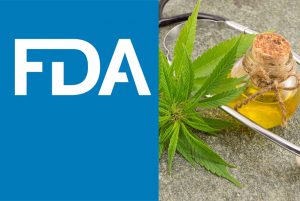
Federal health officials are standing firm against cannabidiol use in food, issuing a fresh round of warnings to companies making CBD edibles.
The U.S. Food and Drug Administration (FDA) said Monday that it “cannot conclude that CBD is generally recognized as safe (GRAS) among qualified experts for its use in human or animal food” based on the current lack of scientific information to support cannabidiol as a food ingredient.
GRAS is a distinction the FDA uses to signify that a substance has been generally recognized, among qualified experts, as having been adequately shown to be safe for the conditions of its intended use.
Without the GRAS designation, a food ingredient must get premarket approval and undergo review by the FDA before it can be legally sold.
The FDA said it continues to explore potential pathways for CBD products to be marketed lawfully, including ongoing work to obtain and review data to address questions about the safety of cannabidiol products. The agency also plans to provide an update on its progress in the coming weeks.
“We recognize the significant public interest in CBD, and we must work together with stakeholders and industry to fill in the knowledge gaps about the science, safety and quality of many of these products,” said Dr. Amy Abernethy, an FDA deputy commissioner and the top official leading the CBD task force.
More warning letters issued
The agency also sent warning letters to 15 companies for illegally selling CBD products in ways that violate the Federal Food, Drug and Cosmetic (FD&C) Act and published a revised consumer update detailing its concerns about the safety of CBD products.
Under the FD&C Act, any product intended to treat a disease, has a therapeutic or medicinal use or intends to affect the structure or function of a human or animal body is a drug, the FDA reiterated.
The agency also noted it has not approved any CBD products except for Epidiolex, a prescription drug for the treatment of severe forms of epilepsy.
The companies that received warning letters were:
- Koi CBD, Norwalk, California
- Pink Collections, Beverly Hills, California
- Noli Oil, Southlake, Texas
- Natural Native, Norman, Oklahoma
- Whole Leaf Organics, Sherman Oaks, California
- Infinite Product Co., doing business as Infinite CBD, Lakewood, Colorado
- Apex Hemp Oil, Redmond, Oregon
- Bella Rose Labs, Brooklyn, New York
- Sunflora, Tampa, Florida/Your CBD Store, Bradenton, Florida
- Healthy Hemp Strategies, dba Curapure, Concord, California
- Private I Salon, Charlotte, North Carolina
- Organix Industries, dba Plant Organix, San Bernardino, California
- Red Pill Medical, Phoenix
- Sabai Ventures, Los Angeles
- Daddy Burt, dba Daddy Burt Hemp Co., Lexington, Kentucky
“As we work quickly to further clarify our regulatory approach for products containing cannabis and cannabis-derived compounds like CBD,” Abernethy said, “we’ll continue to monitor the marketplace and take action as needed against companies that violate the law in ways that raise a variety of public health concerns.”
The agency stated that there is no FDA evaluation of whether these products are effective for their intended use, guidance on proper dosage, how they may interact with FDA-approved drugs, side effects or other safety concerns or manufacturing practices.
Consumers could put off medical care because of unsubstantiated marketing claims on unapproved CBD products, the FDA warned. The companies that received warning letters had made additional claims that were flagged.
“We remain concerned that some people wrongly think that the myriad of CBD products on the market, many of which are illegal, have been evaluated by the FDA and determined to be safe, or that trying CBD ‘can’t hurt,’” Abernethy said.
The FDA has a history of sending warning letters to companies making unsubstantiated marketing claims about their products, giving the companies 15 working days to respond and provide information on how they will correct the violations. If they don’t the FDA threatens legal action including product seizure and injunction.
To date, there are no records of FDA taking additional action beyond sending warning letters.
The FDA’s full announcement is available here.

